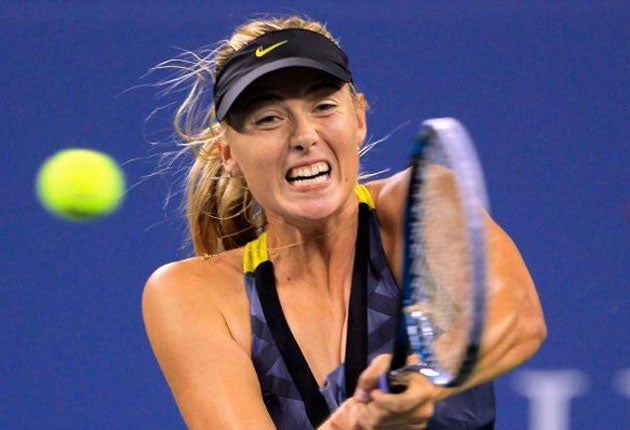Brian Viner: When silent majority let tennis become a shouting match, only the rule-benders win
The Last Word

Maria Sharapova eventually steamrollered Heather Watson in Monday's first round of the US Open – as she had Laura Robson at Wimbledon – but not before the 19-year-old from Guernsey, like Robson, had made the world's highest-paid female athlete look decidedly second best.
And at the end of their three sets, there is no doubt that the victor got a less rousing ovation than the vanquished from the crowd at Flushing Meadows.
From where I was sitting, on my living-room sofa, there seemed to be four reasons for this. First, there was a sizeable contingent of Brits watching. Second, the voluble spectators at the US Open always back a battler. As Jimmy Connors once put it: "New Yorkers love it when you spill your guts out there. Spill your guts at Wimbledon and they make you stop and clean it up."
Third and fourth, American tennis fans have never entirely taken Sharapova to their hearts, and one of the reasons is the hullabaloo she makes, which throughout the first set and much of the second, in the echoey Arthur Ashe arena, was louder than even I, as a seasoned Sharapova-listener, had ever heard before. My sometime colleague Nick Bollettieri, whose tennis academy in Florida crafted not only Sharapova's game but also Watson's, would take me to task for moaning about the shrieking. "Holy cow, enough already, Bernard!" he would exclaim (he's not great with names). The great man feels that everything that needs to be said or written on the subject, has been. But really, had it been an actual steamroller out there steamrollering Watson, the noise could not have been any louder.
It sounded like the final throes of labour, with an agonising contraction at every moment of impact of ball on racket. And even if it didn't distract Watson, the feeling that it might was enough to sway the crowd, the more so as young Heather plays silently, with just an occasional, pleasing little grunt of exertion. Moreover, while Sharapova probably gets louder when she's losing simply because she's working harder, the suspicion remains that the really loud shriek is another weapon in her armoury, one she can deploy in times of desperation.
All sports have their regrettable features, of course, and many of them have become so familiar in the modern sporting landscape that, as with those big, nasty pylons across swathes of the British countryside, we barely even bother mentioning them any more. What's the point of grumbling about the habitual grappling before the taking of every corner in every football match? When I go on about it, I even bore myself. But of course, the point is this: when the righteous criticism stops, the rule-benders and breakers have won. And while it is not bending or breaking the rules to simulate the sound of childbirth during a tennis match, holy cow, it really should be.
Keepers are a law unto themselves – just ask Denis
At the Independent Woodstock Literary Festival on 16 September, I will be hosting a breakfast discussion, at the King's Arms hotel, with journalist and author Simon Kuper, and Martin Keown, whose incisive analysis bolsters my theory that the best football pundits are almost always ex-defenders. Lee Dixon, Alan Hansen and the impressive new boy on the block, Gary Neville, offer further evidence that defenders understand the game better than strikers, perhaps because as players they used their brains rather than their instincts.
My theory doesn't seem to apply, however, to the ultimate defender: the goalkeeper. I know Peter Schmeichel sometimes pops up on the telly, and I've seen Paul Robinson doing a bit of punditry, and dear old Bob Wilson enjoyed a decent TV career, but as a presenter rather than a pundit. On the whole there is no position on the football field less represented in the broadcasting studio than that of the goalkeeper, which maybe has something to do with what Denis Law said to me the other day on the subject of goalies. "It's one area I have no idea what I'm talking about it," said Scotland's finest goalscorer. "I know that if five goals go past them they've had a bad game, but I don't know how they do it, or why they do it. I don't class them as football players."
When no news is good news in the world of sport
On Thursday it was reported in The Independent that Gareth Thomas, the former captain of the Welsh rugby union team, having switched codes, has been offered a one-year contract by Wigan, now that the troubled Crusaders club have withdrawn from Super League. Nowhere in the report was there even a fleeting reference to Thomas's status as Britain's most prominent gay sportsman, following his decision almost two years ago to come out.
This, of course, is the way it should be. And when a Premier League footballer finally does what "Alfie" Thomas so courageously did, it will pave the way for a similar newspaper report, in which a gay player moves from one club to another without any mention of his sexuality. Yet the way waiting to be paved is strewn with sticks and stones, which is why nobody wants to be the first. When he does eventually step forward, it will, to paraphrase another brave pioneer, represent one small step for man, one giant leap for a mature society. Even if the volume of homophobic ranting makes him want to step back again, he will, like all pioneers, have made the same journey a little easier for those who follow.

Join our commenting forum
Join thought-provoking conversations, follow other Independent readers and see their replies